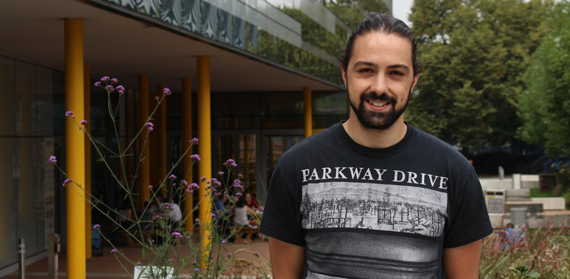I sometimes think of myself as a fraud. As a Master’s by Research (MScR) student in psychology, I can get away with sitting and reading about what interests me all day. Compared to other professions, it is a pretty good deal! An MScR is a kind of intermediate between an undergraduate degree and a PhD where you gain independent research experience, and then have the opportunity to treat it as the first year of a PhD programme.
It was relatively early in my undergraduate degree that I concentrated on a route into research. During my second year I was a voluntary research assistant for one of the lecturers, and produced a literature review of studies investigating attentional bias in different types of smokers. It appears I did a good job as I have continued with the topic, and the lecturer has been my supervisor ever since! I would advise pestering members of staff to see if there is anything you can help with if you are interested in research. The worst they can say is no, but most of them are so busy they will happily pass some of the work on to you. If you do some good work, this can lead to further opportunities and it is all experience that you can put on your CV.
Fast forward a few years and I am still interested in different smoking groups. The typical image of a smoker is someone who huddles around their lighter every few hours to top up their nicotine levels. However, an increasingly large number of smokers only have a few cigarettes per day and show very little nicotine dependence. This is where it gets interesting as despite the differences in nicotine dependence, light and heavy smokers find it equally difficult to stop smoking. For my project I am trying to find out what factors contribute to this difficulty beyond the effects of nicotine dependence.
One of my favourite parts of being a research student is working with other research students. Although you are not necessarily researching the same topic, you often experience the same issues as each other. I work in a shared office with six other students at various stages of their PhD. It is useful to be able to share ideas and talk about anything you are struggling with as someone else has usually experienced it at one time or another. Although it can sometimes be difficult to concentrate when people are talking, it is worthwhile working alongside other research students.
Another aspect of postgraduate research that I enjoy is the ability to teach on undergraduate modules. In terms of gaining experience, it has been one of the best opportunities I have taken. The first few sessions are certainly nerve-racking, and it is not easy going from being sat at the back of the classroom to standing at the front of it. However, starting to get the experience early in your career will only help when it comes to the frantic job search at the end. This has largely come from one of the best pieces of advice I got when I was an undergraduate student: work backwards. Consider the type of job you want and see what sort of skills and experience are needed. As I want to be a lecturer in psychology, starting to get paid teaching experience when it is available is crucial.
My typical day consists of an early start as I like the feeling of completing a few tasks before the second coffee of the day. The majority of a postgraduate research degree consists of reading, writing, and reading some more. I personally love reading, and one of the best ways to feel productive is to make your way through a few articles in the morning. The majority of my teaching starts around 10am, so I spend two hours leading a workshop or seminar before lunch. I can get the most work done in the afternoon as I have fewer distractions and this leads up to around 5pm. However, this is a typical day and one of the benefits of a research degree is the flexibility and variation it provides you. Some days you might not having any teaching, and you find it easier to work from home in your pyjamas. Other days you might have more teaching, go to a workshop, and attend a research group meeting which gives you very little time to do your own work.
It has not always been easy transitioning from being an undergraduate, but my experience of being a postgraduate research student at Coventry University has been both rewarding and critical for my development as an independent researcher.
If you have any questions about postgraduate research, feel free to contact me on bartle16@uni.coventry.ac.uk. Alternatively, I spend an unhealthy amount of time on Twitter (@JamesEBartlett).







